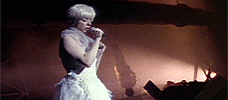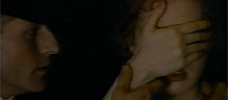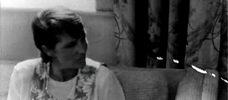Reviews
David Lynch
USA, 1997
Credits
Review by David Carter
Posted on 16 July 2010
Source Focus Features DVD
Categories David Lynch’s 1990s
Is it possible for a work of art to be too complicated to be appreciated? Composer Fred Lerdahl addresses this topic in his essay “Cognitive Constraints on Compositional Systems1” in which he examines the relationship between the construction of avant-garde music and the listener’s reception of it. He suggests that a point exists where a piece of music becomes too complicated to be understood, noting that some modern works pursue “complicatedness as compensation for a lack of complexity.” Here, Lerdahl makes a distinction between the artifice of being “complicated,” the quality of being consciously constructed to be difficult, and being “complex,” a natural state of emotional and creative depth. He summarizes his thesis by stating, in essence, that some music is too complicated to be appreciated or enjoyed by listeners.
While I find Lerdahl’s argument myopic, based as it is on the assumption that an enjoyment of complicated art is physiologically impossible, it can be used as an intriguing vantage point from which to begin to analyze a film. Lerdahl’s thesis does not address the topic of film studies, but the argument of complexity and its relationship to artistic merit has been voiced often. Is it possible for a film to be too difficult for viewers?
This question has a special relevance to David Lynch’s Lost Highway: “too difficult” and “overly complicated” being the two most frequent criticisms of the film. Anyone familiar with Lynch’s oeuvre will immediately recognize the irony of singling out one of his films as being especially difficult, but Lost Highway remains a polarizing work, even among his fans. The film was not received warmly by audiences or critics and it remains Lynch’s most overlooked, and perhaps underestimated, film. Contrary to Lerdahl’s analysis of art, I maintain that works that present the greatest challenge to the audience are invaluable and offer a vastly more rewarding experience, and it is my assertion that Lost Highway is such a film. To dismiss it as merely complicated is to ignore the complexity of the film, the layers of perception and understanding that Lynch works with, and depth of emotions on display. Terrifying, confounding, and sublimely beautiful, Lost Highway is not a film that defies analysis but rather one that demands it.
Lost Highway begins with saxophonist Fred Madison trapped in a crumbling marriage to the beautiful Renee, who remains an enigma to him, perhaps purposefully so. He suspects her of being unfaithful but is derailed in his pursuit of the truth by the encroachment of the uncanny into his life. Every morning, Madison wakes to find a videotape on his front step without evidence as to who has left it and for what purpose. The first tape shows an innocuous view of his home’s exterior, but subsequent tapes reveal that someone has been inside their home without their knowledge. Already in a state of unease, Fred has a chance encounter with a mysterious, white-faced man at a party, who disturbingly tells him that he is currently inside Madison’s home and even allows Fred to call him using his cell phone. Fred searches the house upon his return that night, finding nothing. The next morning, he views the now-expected tape left outside to see himself having apparently killed Renee.
Sentenced to death, Fred tries in vain to remember the events of that night and begins having intense headaches. His cries of agony are ignored by the guards and when they check his cell the next morning, Madison is gone. In his place is a young mechanic named Pete Dayton. Pete has no memory of how he got into Madison’s cell or of the days prior to that. He returns to his parents’ home and resumes his normal life of his job, friends, and girlfriend Sheila. He begins an affair with the gorgeous Alice Wakefield, the lover of vicious mobster Mr. Eddy and, unbeknownst to Pete, a dead-ringer for Renee. Mr. Eddy, who is known to police as “Dick Laurent,” learns of the affair and plans to deal with Pete and Alice severely with the help of Madison’s Mystery Man. Alice offers Pete a way out of their predicament and leads him into a web of theft and murder, during which Pete begins to suffer from intense headaches and strange hallucinations. The episodes become more violent when Alice reveals that she has tricked him and Pete finds himself transformed into Fred Madison. Fred is once again confronted by the Mystery Man and he struggles to connect the links between himself, Pete Dayton, Renee, Alice, Mr. Eddy, and Dick Laurent.
The mistake people make with Lost Highway is to search for one concrete meaning. The film is, metaphorically, a puzzle, and the temptation is there to view it as a literal puzzle as well. It is incorrect to assume that if one analyzes individual pieces that connections will appear, pieces will begin falling into place one after the other, and eventually a complete picture or construct will emerge. To attempt to definitively ascribe meaning to any aspect of the film is to limit one’s experience of it. Once you’ve assigned a meaning to a flash of blue light, a headache, or even the color of Fred Madison’s bed linens, you’ve effectively prevented them from being anything else. This method of thinking runs counter to the film’s recurrent themes and its internal filmic logic. Lost Highway is a film about moving, changing, becoming something and someone else—to assume a concrete meaning in any of it is to arrest this process.
The idea of transformation as an ongoing - and possibly endless - process is key to Lost Highway. Three of the film’s main characters have multiple identities, Fred/Pete, Renee/Alice, and Dick Laurent/Mr. Eddy, all of which seem to exist simultaneously. It shouldn’t be taken as a coincidence that the lives of these three characters are linked, nor should it be assumed that the other characters do not have doubles because they aren’t shown2. Renee/Alice and Dick Laurent/Mr. Eddy fail to complete the transformative process, as Fred murders one half of their binary identities. In doing so, Fred emerges as the only being capable of constant change—successfully merging both aspects of his identity as evidenced by his ability to remember Pete’s life after he physically shifts back to Fred’s body.
The “Lost Highway” itself is the film’s primary metaphor and the one in which this theme of transformation is best seen. Lost Highway is a metaphysical road movie, concerned with the distance between one state of being and another rather than that between two points on a map. There are echoes of the country song “Lost Highway,” written by Leon Payne but popularized by Hank Williams, throughout the film, particularly the line, “a woman’s lies make a life like mine.” Fred travels the “lost highway” in the film, literally lost in another identity as Pete before finding his way again and returning to his true identity. When Fred reemerges, he does so with a greater understanding of what is happening, an understanding that is not explicitly shared with the audience. He acts with a greater sense of purpose after returning, hunting down Mr. Eddy/Dick Laurent for his transgressions against him in both lives and visiting himself in the past to make sure the cycle of rebirth is started. The closing scene of the film shows Fred on the “lost highway” again, both in the sense of being on the abandoned desert road and beginning his transformation into yet another identity.
The most popular theory on Lost Highway revolves around a term that Lynch mentioned in interviews for the film and in his book, Catching the Big Fish: “psychogenic fugue3.” A psychogenic fugue, or fugue state, is a type of dissociative amnesia and is typically marked by the patient constructing a new identity with no memories of their past life or the traumatic event which triggered the state. In this reading of the film, Fred Madison murders his wife, Renee, because he suspects she has been unfaithful. While awaiting his execution, Fred enters a fugue state where he imagines himself to be Pete Dayton.
There are problems with the fugue state theory and Lynch’s reluctance to commit to this as a definitive reading of the film suggests that there is more at work than selective amnesia and Fred’s dream of a better life. One main problem with the theory is that it places a primacy on the Fred Madison portion of the narrative over Pete Dayton’s. This bias likely arises from the experience of watching the film: Madison is introduced first, and actor Bill Pullman appears on the promotional materials for the film and is “the star,” for lack of a better term, therefore the audience will view whatever he does as more important.
Perhaps the biggest problem with the fugue state theory is that it ignores the supernatural elements in Madison’s story. It is Madison that interacts with Robert Blake’s Mystery Man, who displays the ability to be in two places at once (bi-location) and to appear out of thin air (teleportation). Madison’s initial conversation with the Mystery Man is best explained by his response (“That’s fucking crazy, man”), but it is this conversation that gives a glimpse of how the supernatural has seeped into Madison’s life. He is being haunted, but by whom or what remains a question, and there is the possibility that he is haunting himself, in a manner of speaking4.
I would argue that there are multiple Fred Madisons present in the film prior to the introduction of Pete Dayton. The visual similarities between the Madison home and Twin Peaks’ Red Room cannot be discounted. Both locations are the loci of change and supernatural events in their respective works and through viewing the home in this manner, Lost Highway’s maze of doppelgangers and multiple identities is given some clarity. Upon returning from Andy’s party, Fred disappears into the blackness of the red hallway. We next see him gazing at his face in the mirror, not unlike Agent Cooper in the last scene of Twin Peaks’ series finale. At this point, he is no longer Fred, nor is he specifically located in the Madison home, as shown through Renee’s failure to get a response to her calls for him. It is quite possible that Fred is someone else when he returns and it is this other being that murders Renee, thus explaining his inability to recall the event as genuine rather than selective amnesia.
The mysterious videotapes left on Fred’s doorstep every morning are one of the most unsettling plot points in film history, rivaling the most visceral horrors in their power to unnerve5. There is no logical explanation for them. If the Mystery Man made them, their purpose seems to be only to torment Fred. If they are Fred’s repressed memories - as is often stated in the fugue state theory - then it seems odd that it would be Renee who initially finds them and that Fred would be recalling the events in the third person. It is important to note that the final tape does not show Fred murdering Renee, but rather him kneeling next to her corpse: perhaps another clue to Fred’s innocence.
The film’s first scene of Fred Madison using the intercom to tell Fred Madison that “Dick Laurent is dead” is difficult to satisfactorily explain using the fugue state theory or any other type of analysis. This scene shows Fred after the events of the film take place speaking to Fred before the events of the film take place, yet occurs first chronologically. This scene is one of the more problematic for those attempting to establish a clear meaning for every event in the film, but it is one that is especially illuminating for what I feel to be the more appropriate reading, one in which all aspects (time, meaning, identity) are transient and constantly changing. This scene depicts Fred simultaneously existing in two times, two places, and in two states of being, hinting a further connection between Fred and the Mystery Man since they display the same abilities6.
During the interviews preceding the release of Lost Highway, Lynch responded to an interviewer’s pressure for an explanation of the film with, “When it comes down to explaining things, I stop. With most films, there is problem understanding them, there’s no room to dream or to find your own interpretation and I don’t want my thing to get in the way of anybody else’s idea7.” Lost Highway is an invitation to dream. It presents the viewer not with a completed narrative but with the materials with which to create their own. Your interpretation of the film will be different from mine. My own interpretation of the film will be different the next time I watch it, just as this interpretation was different than previous ones. The film’s complexity is its strength, and part of the joy of Lost Highway is that so much of it cannot be explained. Lynch has literally put us in the driver’s seat barreling down the lost highway, our faint headlights giving us only a small suggestion of what might be in surrounding darkness. It is up to us to fill that void.
- Contemporary Music Review, 1992, Vol. 6, Part 2, pp. 97-121 ↩
- I believe that two other characters meet their doubles: the investigation of Andy’s death has the two teams of detectives come face to face. ↩
- Catching the Big Fish, 2007 paperback edition, p 109. ↩
- There is therefore a substantial amount of evidence internal to the film that it is in fact the Pete Dayton section that is the more “real” as it lacks these elements of the supernatural. If Lost Highway is about a fugue state, we must entertain the idea that it is Dayton’s fugue state, not Madison’s ↩
- This plot device also appears in Haneke’s excellent Cache, which contains a possible nod to Lost Highway through the use of the surname Laurent. ↩
- Another view would be to take this scene as an allusion to Sisyphus, the Buddhist concept of reincarnation, or Nietzsche’s Eternal Recurrence. One Fred drives away, police giving chase, destination unknown, while the other Fred is fated to relive the events of the film in an endless loop. ↩
- “911: David Lynch Phone Home,” Filmmaker, Winter 1997. ↩
More David Lynch’s 1990s
-

Industrial Symphony No. 1
1990 -

On the Air
1992 -

Hotel Room
1993 -

Premonitions Following an Evil Deed
1995 -

Lost Highway
1997
We don’t do comments anymore, but you may contact us here or find us on Twitter or Facebook.



